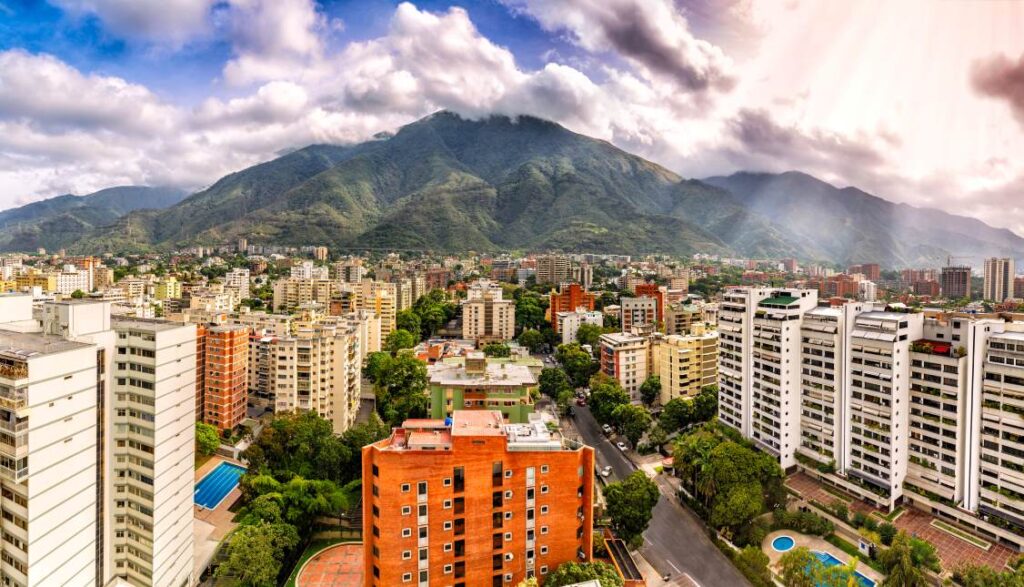International Movers To Venezuela

Moving to Venezuela from the U.S.
Moving to Venezuela will be as challenging as it would have been to relocate to any other country. Venezuela is a very favorable place for migration with a mesmerizing natural and wild landscape. This country lies below the Tropic of Cancer, and it is bordered by the Caribbean Sea towards the East.
Officially named the Bolivarian Republic of Venezuela, the country is located on South America’s northern coast. Venezuela features a diverse population of Mestizo, Caucasian, and African descent. Venezuela is known to be a federal republic that comprises around 23 states and Caracas is the capital city of this country. The most popularly spoken language in Venezuela is Spanish, however, even the native indigenous languages are considered official in this country. The expat community in Venezuela tends to bring their twist and turn to the mix.

Venezuela has an approximate population of around 28 million people and is one of the most diverse countries in the world. In Venezuela, you can enjoy both intercultural and unique experiences if you dare to do so.
Venezuela’s largest city and capital is Caracas, which contains a heavy amount of the country’s population. In fact, a majority of residents live in the northern parts of Venezuela, specifically the urban areas. These cities make Venezuela one of the most urbanized nations in Latin America. Though the country is urbanized, Venezuela also features beautiful beaches and scenery, as well as some of the largest oil reserves in the world.
Customs Regulations for Venezuela
NOTE – Customs regulations are subject to change at any time. The proceeding information is a brief summary of customs regulations applicable to household goods shipments to this destination and is being provided for general guidance to assist our Agents and Customers. Since such regulations are subject to change without notice, International sea & air shipping cannot be held liable for any costs, damage, delays, or other detrimental events resulting from non-compliance. Always double check with your local embassy or consulate.
Call our International Moving Specialists @ (866) 315-4170
Is Venezuela a good choice for an expat?
There has been a significant decline in the expat community of Venezuela due to political and economic instability. However, a few members of the community who are associated with the oil industry are continuing to live in this country. Also, the business environment in Venezuela isn’t formal as compared to that of Europe and North America. The expats feel that there’s a lot of corruption in the workplace of Venezuela.
Maracaibo, Anaco, Puerto La Cruz, and Caracas are some of the major cities of Venezuela and are popular among the expats. If you consider moving to any of these cities, you will get an opportunity to connect with other members of the expat community. Perhaps, their support and guidance will help you enjoy a smooth transition in this new country.
Important factors that you must consider before International moving to Venezuela from USA
Living costs in Venezuela
Economic crisis and hyperinflation can bring a significant change in the cost of living in Venezuela. Though some products and services may be extensively cheap for Western expats, practically it can be difficult because of shortage of supply and fluctuations in currency. As a result of economic instability, it gets too difficult to procure certain items, which may even include some essentials as well. This will create a huge impact on both the living cost and the quality of living in the new country.
- Food items are available at an extensively reasonable rate in Venezuela. This will include the imported items as well as the cost of eating at restaurants.
- Though the country is known for its oil reserves, there may be a shortage of fuel and transportation issues. This will have a huge impact on the public transport sector and the usage of private transport.
- Both house rents and utility services are affordable in Venezuela until you don’t relocate to any of the metro cities. Since the earning potential for ex-pats is less in this country, all these factors are relative. However, people earning foreign currency can enjoy a much more lavish lifestyle as compared to others.
Climate of Venezuela
- Venezuela is known for its tropical dry and rainy climate so traveling will be possible throughout the year.
- The average temperature in the daytime will be between 25 degrees to 35 degrees centigrade.
- The average temperature at nighttime will be something between 15 degrees and 25 degrees centigrade.
- The sea in Venezuela is warmer and the climate of inland is a degree lesser than that of the sea.
- The Andes are cold during the nighttime.
- The possibility of rainfall would be there occasionally, but such showers don’t last for long.
Culture of Venezuela
Venezuela defines an amalgamation of culture with an influence of European culture, mainly Spain and West African culture. The country is diverse with a rich cultural heritage and many interesting traditions to follow. According to the expats, the people of this country are warm and have a very welcoming nature. Also, they find the music of this country to be entertaining and fascinating.
Education of Venezuela
If you have kids who will be moving with you to Venezuela, education is another important factor that you may want to consider. The education system in Venezuela is mostly good and the country also has a high rate of literacy.
Here’s what you need to know about international schools in the new country:
- Basic education in Venezuela is free of cost and it’s mandatory for children between the age group of 6 to 15 years.
- Secondary education is also free in Venezuela; however, it isn’t mandatory. Secondary education in Venezuela lasts for 2 years.
- Both the public and private institutions in the country offer higher education and around one-fourth of the secondary school pass out opts for such classes.
So, if you are an expat, you can choose an international school for your kids as such types of schools provide similar types of education across the world. This will make the overall transition process between the schools easier for the ex-pat children.
International schools may have the local population as well, but such schools prepare a curriculum that targets international students. Also, the primary mode of instruction can be any language, but most schools opt for English, Spanish, French, Japanese, and German.
The healthcare system in Venezuela
The public healthcare system in Venezuela is easily accessible by the expats as well as locals of the country. Unfortunately, due to the turn of events, this healthcare system has taken a bad shape. If you can afford it, you must opt for the private healthcare options in this new country. The reputed private hospitals in the capital city of Caracas have access to it, so plan it accordingly, while making this international move.
Simultaneously, medical treatment in Venezuela can be too costly if you need private medical aid in this country. If you are an expat, it will be recommended to purchase a comprehensive health insurance package as this will cover the health issues of your family members and provide wider access to healthcare facilities as well as support to deal with medical emergencies.
If all these factors satisfy you, and you are ready to relocate to Venezuela, there are a few mandatory requirements you need to know as well for moving abroad.
Entry requirements you must know before moving to Venezuela
The Venezuela immigration department will require you to complete the following requirements after you decide to relocate there.
- You need to have a valid passport and a Venezuela visa while traveling to Venezuela from the United States.
- You must obtain the visa well in advance from the most convenient Venezuelan consulate or embassy.
- The immigration authority of Venezuela will require your US passport to have at least six months of validity from the arrival date. Also, the passport should be in good condition, as a few US citizens have been detained by the immigration authority for the bad condition of their passport.
How to apply for citizenship in Venezuela?
If you are moving to Venezuela for a job or study, applying for a short-term visa will be the first thing you need to do to get citizenship in this new country. Moreover, you must be living in this country temporarily if you want to be eligible for residency there. Following this you can go ahead and apply for the national identity card of the country.
It will take a few years for you to obtain citizenship in the country until you move there to get married. You must have a valid residency status for at least 10 years to be eligible for citizenship in Venezuela. Simultaneously, you can enjoy dual citizenship rights, one as a resident of Venezuela and the other for being able to use your US documents.
Cost-effective ways for moving to Venezuela from US
Downsize your possessions
The less possessions you have, the less money you will have to pay to move them abroad to your new home. So, it’s recommended you declutter your belongings before you pack them for their new destination.
Sell heavy items
It will be a good idea to sell the bulky items you have, instead of shipping them to the new country. Once, you relocate to Venezuela, you can replace those items by purchasing a new one. Transporting bulky items will cost you a lot.
Request moving quotes
You must seek the moving quotes from at least three international moving companies, compare them and choose the one that gives you the best deal.
Avoid air shipping
If you want to relocate to Venezuela on a budget, you choose the sea shipping option to transport your belongings. Shipping your belongings by ship will take around 3-6 months, but it will be a reasonable option. Alternatively, if you choose to ship your belongings by air, it will take around a few weeks only, however, it will be an expensive process.
Arrange free moving boxes
Buying new moving boxes will increase your moving cost. It will be a better option to arrange for some used moving boxes from the following places:
- Home supply stores
- Grocery stores
- Schools
- Restaurants
You can politely request at the above places to lend you a few used moving boxes. However, you must ensure that the boxes are in good condition so that they don’t break down during the transit.
How International Sea & Air can help for moving to Venezuela
There’s nothing like a perfect choice for moving overseas, it’s all about the factors that you may consider suitable for living in the new country. So, if you have read this guide well, you must have got all your questions answered and decided whether you should move to Venezuela or not.
Through proper research on websites or word of mouth, you can shortlist a few international moving companies, compare their quotes with your budget, and choose the best professional movers for yourself.


 +1 (866) 315-4170
+1 (866) 315-4170 International: +1 (516) 355-5300
International: +1 (516) 355-5300